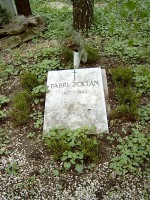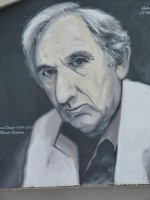László Márkus est un Acteur et Créateur de production Hongrois né le 1 juin 1927 à Budapest (Hongrie)

László Márkus (10 June 1927 – 30 December 1985) was a Hungarian actor. He appeared in over 90 films and television shows between 1952 and 1985. He starred in the 1985 film Első kétszáz évem, which was entered into the 36th Berlin International Film Festival.
Source : Wikidata
László Márkus

Nationalité Hongrie
Naissance 1 juin 1927 à Budapest (Hongrie)
Mort 30 décembre 1985 (à 58 ans) à Budapest (Hongrie)
Récompenses Prix Kossuth, Jászai Mari-díj
Naissance 1 juin 1927 à Budapest (Hongrie)
Mort 30 décembre 1985 (à 58 ans) à Budapest (Hongrie)
Récompenses Prix Kossuth, Jászai Mari-díj
Le plus souvent avec
Filmographie de László Márkus (9 films)
Acteur
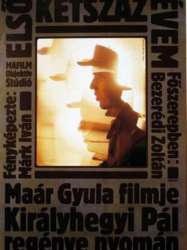
Első kétszáz évem (1985)
, 1h44Réalisé par Gyula Maár
Acteurs Zoltán Bezerédy, Dezső Garas, Anna Kubik, László Márkus, Tamás Major, Mari Törőcsik
Rôle Krausz
Note66%





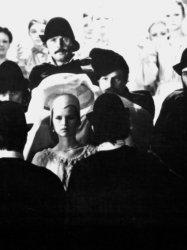
Le Cœur du tyran (1981)
, 1h36Réalisé par Miklós Jancsó
Origine Hongrie
Genres Drame, Historique
Acteurs József Madaras, Teresa Ann Savoy, Ninetto Davoli, László Márkus, György Cserhalmi
Note66%






Le CInquième Sceau (1976)
, 1h51Réalisé par Zoltán Fábri
Origine Hongrie
Genres Drame, Guerre
Acteurs Lajos Őze, László Márkus, Zoltán Latinovits, György Cserhalmi
Rôle Király László
Note84%





L’hiver 1944. Une poignée d’amis se trouvent réunis dans une salle de torture. Pour avoir le droit de sortir, ils doivent gifler un prisonnier en train d’être torturé mais ils sont incapables d’un tel geste. Király le libraire et ses compagnons, donnent leur vie pour conserver une part d’humanité. Seul l’horloger Gyuricza accepte, la mort dans l’âme, d’assener les coups, dans le seul but de sauver les enfants juifs cachés dans son appartement.

Hugó, a víziló (1975)
, 1h26Genres Drame, Aventure, Animation
Thèmes Afrique post-coloniale
Acteurs Burl Ives, Robert Morley, Paul Lynde, Ronny Cox, Percy Rodriguez, Don Marshall
Note67%





The Sultan of Zanzibar has a harbor infested with sharks, which makes it impossible for ships to trade with him. In an attempt to fix the problem, he brings twelve hippos into the harbor to keep the sharks away. His idea works well enough, but once the hippos are no longer a novelty and the people no longer feed them, they begin to starve. After the hungry hippos rampage through the city looking for food, Aban-Khan, the king's adviser, slaughters all the hippos except one, a little hippo named Hugo. Hugo escapes across the sea to the city of Dar es Salaam, on the African mainland.

Régi idők focija (1973)
, 1h24Réalisé par Pál Sándor
Genres Comédie
Thèmes Sport, Football
Acteurs Dezső Garas, Tamás Major, László Márkus, András Kern, Hédi Temessy
Rôle Turner Pipi
Note66%





Dans les années 1920, Ede Minarik sacrifie sa vie personnelle pour son équipe de football qui peut prétendre accéder à la première division.
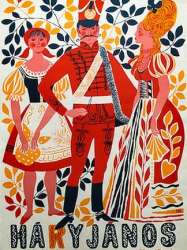
Háry János (1965)
, 1h55Réalisé par Miklós Szinetár
Genres Comédie, Musical
Thèmes La musique, Musique, Politique, Adaptation d'un opéra, Guerres napoléoniennes, Révolution française
Acteurs László Márkus, Gyula Bodrogi, Gábor Koncz
Rôle Ebelasztin
Note74%






Deux mi-temps en enfer (1961)
, 2hRéalisé par Zoltán Fábri
Origine Hongrie
Genres Drame, Guerre
Thèmes Sport, Football
Acteurs Dezső Garas, János Görbe, Tibor Molnár, László Márkus, János Koltai, Zoltán Gera
Rôle Pogány
Note78%





Spring 1944. Nazi officers want to organize a football match for Hitler's birthday, in which Germans would play against Hungarian labour servicemen of war. They call for the famous Hungarian footballer, Ónódi, and order him to organize a team. Ónódi accepts, but in turn demands extra food, a ball with which he and his team can train before the match, and asks that they be allowed to concentrate on training before the match and not work. The Germans accept all the demands, but recommend Ónódi not include any Jews in his team. However, Ónódi can't organize the team only from his company, because only 8 out of 98 Hungarian labour servicemen can play football. Therefore Ónódi recruits players from the other company. One of the players is Steiner, who is a Jew and can't play football. He lied to Ónódi because he was afraid to die. During training the footballers subdue the Hungarian corporal guarding them and try to escape. They are soon recaptured and told they will now face probable death penalty. However, the Hungarian officer orders the Hungarian team to still play the match. At the beginning of the match Ónódi and his team are discouraged, as the Germans easily score three goals. The Hungarians succeed in scoring one goal and the first half ends 3-1 in favour of Germany. At the interval the Hungarian commander tells the Hungarian players that they might not be executed if they lose the match. The Hungarians refuse to believe this. At the beginning of the second half they score three goals. As a result, during the match, they are executed by the Germans.

Szent Péter esernyője (1958)
, 1h34Genres Drame, Comédie, Historique
Acteurs Mari Törőcsik, Sándor Pécsi, Zsuzsa Csala, László Márkus, Martin Ťapák, Emília Vášáryová
Note70%





Art

Mary Ann (1919)
Réalisé par Alexander Korda
Genres Drame
Acteurs Ica von Lenkeffy, Tivadar Uray, Gyula Szöreghy
Rôle Créateur de production
 Connexion
Connexion
